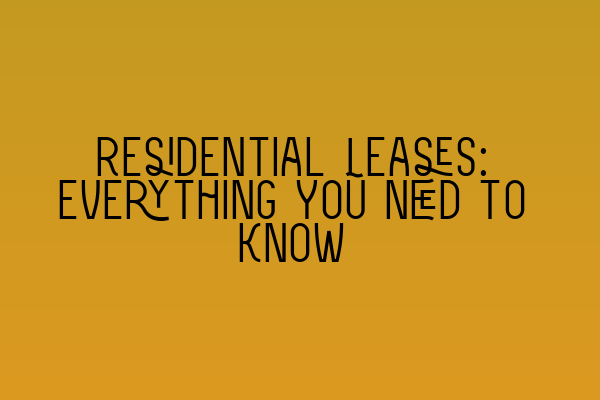Residential Leases: Everything You Need to Know
When it comes to residential leases, it’s important to have a clear understanding of the rules and regulations that govern them. Whether you’re a landlord renting out a property or a tenant looking for a place to call home, knowing your rights and responsibilities can help to ensure a smooth and successful tenancy. In this comprehensive guide, we’ll cover everything you need to know about residential leases, from the basics to the finer details.
What is a Residential Lease?
A residential lease, also known as a rental agreement or tenancy agreement, is a legally binding contract between a landlord and a tenant. It outlines the terms and conditions of the rental property, including the duration of the tenancy, the amount of rent payable, and any rules or restrictions that apply.
Residential leases can vary in length, ranging from short-term leases of a few months to long-term leases of several years. It’s essential to carefully review the lease before signing to ensure that you understand all of its provisions and are comfortable with the terms.
Key Terms and Clauses in Residential Leases
Understanding the key terms and clauses in a residential lease is crucial. Here are some of the most common elements you’ll find in a residential lease:
1. Rent Amount and Payment Terms
The lease will specify the amount of rent payable and when it is due. It’s essential to know exactly how much you’ll need to pay and when to avoid any misunderstandings or disputes.
2. Security Deposit
A security deposit is a sum of money paid by the tenant to the landlord as a form of security for any damages or unpaid rent. The lease will outline the amount of the deposit, how it will be held, and the conditions for its return at the end of the tenancy.
3. Maintenance and Repairs
The lease should detail the respective responsibilities of the landlord and tenant when it comes to maintenance and repairs. This includes who is responsible for minor repairs, such as changing light bulbs, as well as major repairs, such as plumbing or electrical issues.
4. Termination and Renewal
The lease will specify the notice period required for termination or renewal of the tenancy. It’s essential to be aware of these deadlines to ensure a smooth transition when the time comes to either move out or renew the lease.
5. Pets and Subletting
If you have pets or are planning to sublet the property, it’s crucial to check the lease carefully for any restrictions or additional requirements. Some leases prohibit pets altogether, while others may require written consent from the landlord.
Legal Protection and Rights
Both landlords and tenants have legal protections and rights under residential lease agreements. Understanding these can help ensure a fair and transparent tenancy. Here are some key points to be aware of:
1. Tenant’s Rights
Tenants have the right to a safe and habitable living environment. This includes proper maintenance and repairs, protection against unfair eviction, and the right to privacy. Tenants also have the right to challenge any unfair terms in the lease or seek remedies for breaches of contract.
2. Landlord’s Rights
Landlords have the right to receive rent on time and to be protected against property damage. They also have the right to enter the property for inspections or repairs, provided they give reasonable notice to the tenant.
3. Dispute Resolution
In the event of any conflicts or disputes between landlords and tenants, it’s essential to follow the proper dispute resolution procedures. This may involve mediation or, in more serious cases, legal action through the courts. Seek legal advice if you’re unsure how to proceed.
Conclusion
Residential leases play a vital role in defining the rights and responsibilities of both landlords and tenants. By understanding the key terms and clauses in a lease, as well as your legal protections and rights, you can navigate the rental market with confidence. If you have any specific questions or require legal assistance, it’s always a good idea to consult with a qualified solicitor who specializes in property law.
For more information on the SQE (Solicitors Qualifying Examination) and to prepare yourself for the exams, you may find these related articles helpful:
